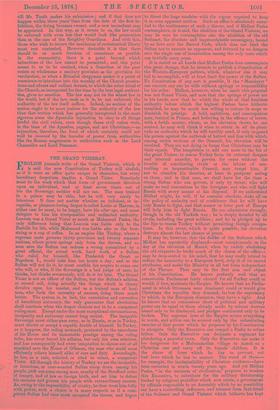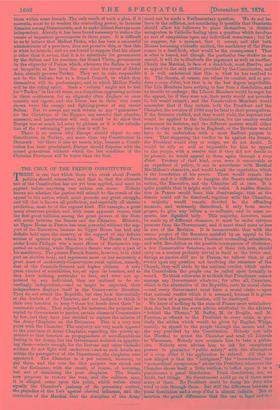THE GRAND VIZIERA.T. E NGLISH journals write of the Grand Vizierat,
which it is said the new Constitution of Turkey will abolish, as if it were an office quite unique in character, but every hereditary despotism implies a Grand Vizier. Somebody must do the work which that form- of government devolves upon an individual, and at least seven times out of ten the Sovereign neither will nor can. The man trained in a palace may be able, but he will very rarely be laborious. It does not matter whether an indolent, or in- capable, or pleasure-loving despot is called Louis or Haroun, in either case he must, to be happy, have his alter-ego, and must delegate to him his irresponsible and unlimited authority. Louvois was a Grand Vizier as much as Mahmoud Pasha, the only difference being that Louvois was liable only to the Bastille for life, while Mahmoud was liable also to the bow- string or a cup of coffee. In an empire like Turkey, where a supreme caste governs thirty provinces and twenty separate nations, where power springs only from the throne, and no man save the Sultan can redress a wrong committed by a great official, the actual work, hard work, of a Sultan _ who ruled for himself, like Frederick the Great or Napoleon I., would take him ten hours a day ; and as the Sultan will not do it, he must confide his sceptre to some one who will, or who, if the Sovereign is a bad judge of men, he thinks, but thinks erroneously, will do it for him. The Grand Vizier is not an officer of the Sultan, but the Sultan's adlatus, or second self, doing actually the things which in theory devolve upon his master, and as a trained man of busi- ness, who feels the necessity of success, doing them much better. The system is, in fact, the correlation and corrective of hereditary autocracy, the only guarantee that absolutism shall continue when the despot chances not to be a competent ruling man. Except under the most exceptional circumstances, incapacity and autocracy cannot long coexist. The incapable Sovereign must either pass away, as in Russia, or as in Turkey, must choose or accept a capable double of himself. In Turkey, as it happens, the ruling monarch, protected by the sacredness of his House and its immutable prestige among the ruling tribe, has never feared his adlatus, but only his own relatives, and has consequently had every temptation to choose out of all mankind save the House of Othman, the man who could most efficiently relieve himself alike of care and duty. Accordingly, he has, as a rule, selected, or tried to select, a competent Vizier. All through the history of Turkey we see the incapable, or luxurious, or over-wearied Sultan stoop down among his people, pick out some strong man, usually of the Strafford order of temper, and of low or foreign birth, and set him to defeat his enemies and govern his people with extraordinary success. As, owing to the impossibility of rivalry, he dare trust him fully with power, such a choice is in many respects as if a com- petent Sultan had once more mounted the throne, and begun to direct the huge machine with the vigour required to keep it in even apparent motion. Such an office is absolutely essen- tial to the continuance of such a throne, and if Midhat Pasha contemplates, as is said, the abolition of the Grand Vizierat, we may be sure he contemplates also the abolition of the old Sultanet, the absolute and imprescriptable sovereignty, bound by no laws save the Sacred Code, which does not bind the Sultan not to execute an opponent, and fettered by no dangers save the single one of insurrection among the only caste which can lawfully carry arms.
It is stated on all hands that Midhat Pasha does contemplate this great change, that he intends to publish a Constitution of the Western-European pattern, which, whatever else it may fail to accomplish, will at least limit the power of the Sultan. No Constitution of any sort is possible, if the " Manslayer " can execute any one he wills without apology or responsibility for his order. Midhat, however, when he made this proposal was not Grand Vizier, and now that the springs of power are in his hands, now that he wields the whole of that limitless authority before which the highest Pashas have hitherto trembled, he may be much less willing to reduce its scope or diminish its prestige. A bold, ambitious, and unscrupulous man, trained in France, and believing in the efficacy of terror, with a feeble master, whom, as his elevation shows, he can control, he may well think it wiser to retain in all its pleni- tude an authority which he will terribly need, if only to guard his person against the outbreak of hatred and fear with which, among entire sections of the Osmanli, his elevation will be received. They are not dying in heaps that Christians may be their equals. The temptation to add one more to the list of the great Viziers, to rescue Turkey from its external dangers and internal anarchy, to govern for years without the trouble of conciliating rivals or the labour of, con- trolling an impracticable Council, may tempt him, if not to abandon his theories, at least to postpone acting on them ; and in that case, we shall have for the time a strong Sultan who can govern, if only by terror, who will make no real concessions to the foreigner, and who will fight Russia with every means at his disposal. If we understand Midhat aright, he will, if he remains absolute, stake all on the policy of audacity and of confidence that he will have only Russia to fight, and that sooner or later part of Europe will help him to fight Russia. He can administer strongly, though in the old Turkish way ; he is deeply dreaded by all rivals, including the great soldiers ; and he is pledged up to the lips to rescue Turkey without permitting foreign occupa- tions. In this event, which is quite possible, his elevation destroys almost the last chance of peace.
It may be, however, that the dislike of the Sultanet which Midhat has repeatedly displayed—most conspicuously on the day of the elevation of Murad, when by rudely abolishing the old etiquette he broke much of the charm of the office— may be deep-seated in his mind, that he may really intend to reduce the monarchy to a European level, strip it of its sacred attributes, and make the Ministry in all but form independent of the Throne. That may be the first aim and object of his Constitution. He knows perfectly well that no conceivable Parliament fairly elected for all Turkey could or would, if free, maintain the Empire. He knows that no Parlia- ment in which Ottomans were dominant could or would give Christians the equality they demand, far less the supremacy to which, in the European dominion, they have a right. And he knows that no concessions short of political and military power can be equal to those already made by solemn decrees issued only to be disobeyed, and pledges contracted only to be broken. The supreme laws of the Empire secure everything in words, and action can be secured only by the unhesitating exercise of that power which he proposes by his Constitution to abrogate. Only the Executive can compel a Pasha to refuse bribes. Only the Executive can decimate a regiment for plundering a peaceful town. Only the Executive can make it too dangerous for a Mahommedan village to march on a Christian one and carry off its female children. It is the abuse of force which he has to prevent, not bad laws which he has to correct. The worst of them— for example, the inadmissibility of Christian evidence—have been corrected in words twenty years ago. And yet Midhat Pasha, "in the interests of civilisation, proposes to weaken this Executive, to substitute for the military dictatorship backed by religious prejudice which now exists, a government by officials responsible to an Assembly which by no possibility can have a controlling influence, and released from that dread of the Sultanet and Grand Vizierat which hitherto has kept them within some bounds. The only result of such a plan, if it succeeds, must be to weaken the controlling power, to increase disunion among Departments, and to make distant Satraps more independent. Already it has been found necessary to reduce the tenure of important governments to three years. It is difficult to ntrto believe that Midhat Pasha, who has been a succeed-ill administrator of a province, does not perceive this, or that this is what he intends ; and we are forced to suppose that his object is other than it seems, that it is to substitute for ,government by the Sultan and his nominee, the Grand Vizier, government by the oligarchy-of Pashas which, whenever the Sultan is weak or incapable, as has been the case since the arrest of Abdul Asia, already governs 'Turkey. They are to rule, responsible not 'to the Sultan, but to a Grand Council, in which they themselves will be predominant, and in which Midhat Pasha will be the ruling spirit. Such a " reform " might not be bad for " Turkey" in the old sense, as a despotism oppressing nations in three continents, for an oligarchy often displays at ones tenacity and vigour, and the Divan has in these very years shown twice -the energy and fighting-power of any recent Sultan. But to accept any such reform as any " guarantee " for the Christians of the Empire, anrsecurity that plunder, massacre, and insurrection will end, would be to show that Europe was as much led away by phrases as it is the calcula- tion of the " reforming " party that it will be.
There is no reason why Europe should object to any Constitution in Turkey, any more than any Constitution in Denmark ; but there is also no reason why, because a Consti- tution has been proclaimed, Europe should dispense with the armed guarantees without which the last condition of the 'Christian Provinces will be worse than the first.



































 Previous page
Previous page